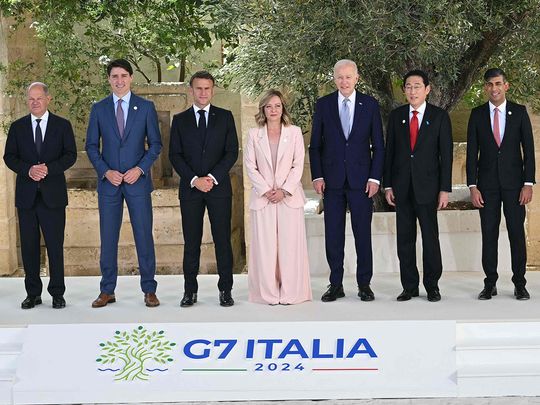
The picturesque coastal resort of Borgo Egnazia in southern Italy played host to last week’s G7 summit, set against a backdrop of unprecedented global challenges. The war in Ukraine stretches into its third year, far-right movements gain momentum in Europe, and the Middle East remains engulfed in conflict.
Amid this turmoil, the liberal democratic world had looked to the G7 for decisive leadership. Yet, the summit convened amid an atmosphere of political instability, with many leaders grappling with domestic crises and electoral pressures.
France’s Emmanuel Macron and the UK’s Rishi Sunak are entrenched in snap election battles. Germany’s Olaf Scholz faces diminishing influence after a setback from far-right nationalists in recent European elections. Canada’s Justin Trudeau, weary after nine years in office, contemplates an exit.
Japan’s Fumio Kishida struggles with plummeting approval ratings ahead of a leadership contest. And the US President Joe Biden arrived at the summit amid personal and political turmoil, overshadowed by his son’s legal troubles and an impending election showdown with Donald Trump.
In stark contrast stood Italy’s Prime Minister Giorgia Meloni, whose political fortunes have soared since taking power. Meloni, buoyed by her far-right party’s strong performance in the European elections, was eager to leverage this summit to advance her strategic interests, particularly on migration, a pressing issue that was prominently on the agenda for the first time in G7 history.
Apart from the G7 nations, the Italian hosts had also invited several African leaders, including the Algerian, Kenyan, and Tunisian Presidents, to discuss migration and development initiatives.
At the end of 2023, an estimated 117.3 million people worldwide were forcibly displaced due to persecution, conflict, violence, human rights violations, and serious public disorder. This figure represents an 8% increase from 2022 and continues a 12-year trend of rising displacement.
By April 2024, the number is expected to exceed 120 million. Currently, 1 in 69 people globally are displaced, nearly double the rate from a decade ago.
Major displacement crises in 2023 included conflicts in Sudan, Myanmar, and the Gaza Strip. In Sudan, over 6 million people were displaced within the country, with an additional 1.2 million fleeing to neighbouring nations. Myanmar saw 1.3 million displaced due to escalating violence since the 2021 military takeover.
Europe's regional pressures
In Gaza, up to 1.7 million people were displaced between October and December 2023. Most refugees are hosted in low- and middle-income countries, often in regions close to their home countries.
With over 120 million people displaced globally — the highest number since World War II — migration poses a critical challenge that demands a coordinated international response. In recent years, Italy has seen a 50% surge in irregular migration from North Africa, reflecting the broader regional pressures that Europe faces.
Meloni’s approach centres on investment in African infrastructure to curb the drivers of migration and entering agreements with African nations to manage migration flows.
The G7 leaders addressed the migration issue during their summit in Italy, focusing on some key areas: combating human trafficking by launching the G7 Coalition to disrupt criminal networks; increasing investment in source countries, primarily in Africa, the Middle East, and Asia, to tackle root causes like poverty and conflict; enhancing border management and curbing transnational organised crime; and creating safe and regular pathways for migration.
Country-specific initiatives included Italy’s deal with Albania to host asylum seekers and its “Mattei Plan” for Africa and the UK’s controversial Rwanda deportation policy.
Insufficient support for developing nations
However, despite these efforts, the G7’s declarations does not specify financial commitments, with aid to Africa at its lowest since 1973. While the G7 summit made some strides in addressing migration through international cooperation and investment strategies, internal disagreements, insufficient support for developing nations, and various implementation challenges remain.
The G7’s opportunity lies in adopting a holistic, humanitarian approach to migration, inspired by frameworks such as the Los Angeles Declaration on Migration and Protection. The LA Declaration, endorsed by the Heads of State and Government of 20 countries in the Americas, emphasises the commitment to creating safe, orderly, humane, and regular migration frameworks.
It acknowledges the need for regional cooperation to address the root causes of irregular migration, exacerbated by the pandemic, and to support migrants, refugees, asylum seekers, and stateless persons.
The LA Declaration’s three-pronged strategy — offering migrants legal status and work permits, expanding safe and legal migration channels, and increasing humane border enforcement — could provide a blueprint for the G7.
Moreover, the G7 must confront the role of human traffickers and smugglers who exploit vulnerable migrants. Strengthening international efforts to combat trafficking and enhance border security, while ensuring the protection and dignity of migrants, is crucial.
The G7 countries in Europe must rise above their domestic challenges and demonstrate a collective will to address the complex issue of migration. That can pave the way for a more stable, equitable, and humane global migration system.









